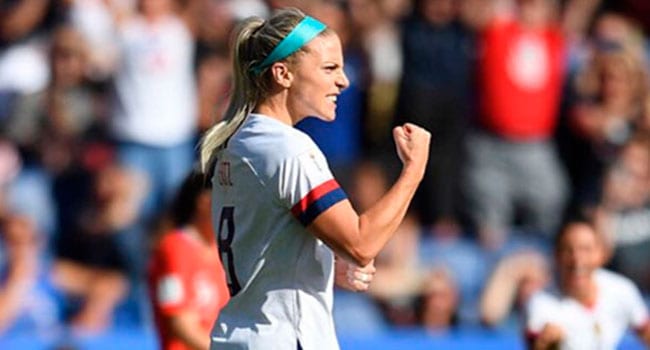 Sexism sucks.
Sexism sucks.
And nobody knows that better than the U.S. women’s national soccer team. The current team members, and their predecessors, have been fighting gender discrimination on the part of the U.S. Soccer Federation (USSF) and the Fédération Internationale de Football Association (FIFA) for decades.
The U.S. national team has been the best women’s soccer team in the world over the last couple of decades. They’ve won multiple World Cup and Olympic titles.
The U.S. men’s national team, on the other hand, is lucky to even qualify for the World Cup every four years. The men’s chances of actually winning the World Cup are two: slim and none.
The women’s team is also more popular in the U.S. When the women’s team beat China in the World Cup final in 1999, it was the most watched soccer game in American history, men’s or women’s. In the three years following the American women winning the 2015 World Cup, U.S. women’s soccer games generated more total revenue than U.S. men’s games, according to audited financial reports from the USSF.
Nevertheless, the women’s team continues to receive unequal treatment, most notably in the areas of playing, training and travel conditions, as well as pay. If the men and women competed in 20 matches and each won all 20 games, the female players would earn a maximum of $99,000, while male players would earn an average of $263,320.
Lindsay Parks Pieper and Tate Royer wrote an excellent op-ed recently about the discriminatory practices the U.S. women’s soccer team has had to deal with since the first women’s World Cup in 1991. They nailed the challenge facing female athletes in general and the U.S. women’s national soccer team in particular:
“The deeply rooted assumptions about women’s inferiority in physical pursuits require female athletes to both win on the field and advocate off it to make strides toward gender equality.”
And advocate off the field U.S. women’s soccer players have done. The members of the national team have changed through the years. Mia Hamm and her teammates are long retired. Yet the fight for justice and equal treatment has been a constant across the years. The U.S. Soccer Federation didn’t even recognize women’s soccer until the 1980s, 70 years after the USSF was formed. And the recognition only came after the threat of a lawsuit on behalf of girls and women.
The fight for equal treatment continues in 2019. Three months ago, 28 members of the national team pool filed a gender discrimination lawsuit against the U.S. Soccer Federation. The suit states that the USSF discriminates against women by paying them significantly less than men’s team members despite the women having far more success on the field.
The women’s team is favoured to win the 2019 World Cup, now being played in France. But the bigger victory they’re after is equal treatment and economic justice.
Last year, the U.S. women’s national hockey team scored a victory on the long path toward equal treatment for female athletes when their threat to boycott the hockey world championships was successful.
“We are asking for a living wage and for USA Hockey to fully support its programs for women and girls and stop treating us like an afterthought,” team captain Meghan Duggan said in a statement at the time. “We have represented our country with dignity and deserve to be treated with fairness and respect.”
Amen.
After a year of negotiations with USA Hockey, the women’s team members got most of their requests, including equal travel arrangements, disability insurance, promotion of women’s hockey, etc.
The soccer team is hoping for a similar breakthrough. Veteran team members like Carli Lloyd, Alex Morgan and Megan Rapinoe have been fighting for equal treatment for years. Lloyd joined four teammates, including Morgan and Rapinoe, in filing a wage discrimination complaint against U.S. Soccer in 2016.
“It had nothing to do with how much I love to play for my country,” wrote Lloyd in a New York Times essay. “It had everything to do with what’s right and what’s fair, and with upholding a fundamental American concept: equal pay for equal play. Even if you are female. Simply put, we’re sick of being treated like second-class citizens. It wears on you after a while. And we are done with it.”
The women’s soccer team’s gender discrimination lawsuit provides the backdrop for this year’s World Cup. Whether you’re pulling for the Americans to win the World Cup or not, those who believe in equal opportunity, social justice, and equitable treatment for both genders in the workplace will be pulling for the American women to win their off-field battle in 2019.
Don’t count them out. These women are fighters.
Ken Reed is sports policy director for League of Fans (leagueoffans.org), a sports reform project. He is the author of The Sports Reformers, Ego vs. Soul in Sports, and How We Can Save Sports.
The views, opinions and positions expressed by columnists and contributors are the author’s alone. They do not inherently or expressly reflect the views, opinions and/or positions of our publication.


